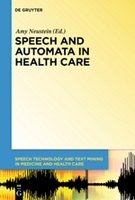Chapter 8 Voice-enabled assistive robots for handling autism spectrum conditions
an examination of the role of prosody
Author(s)
Marchi, Erik
Ringeval, Fabien
Schuller , Björn
Contributor(s)
Neustein, Amy (editor)
Collection
European Research Council (ERC); EU collectionLanguage
EnglishAbstract
Autism spectrum conditions (ASC) are neurodevelopmental conditions, characterized by impairments in social interaction, communication (i.e., verbal and non-verbal language), and by restricted interests and repetitive behaviour. The application of robots as a therapy tool has, however, shown promising results, namely because of the robot’s ability to improve social engagement by eliciting appropriate social behaviour in children with ASC. Robots can also help clinicians in the diagnosis of ASC, by providing objective measurements of atypical behaviours that are collected during spontaneous interactions between autistic children and automata. In this chapter, we provide a review of real-life examples of voice-enabled assistive robots in the context of ASC, examining the critical role prosody plays in compensating for the lack of robust speech recognition in the population of children with ASC. This is followed by a critical analysis of some of the limitations of speech technology in the use of socially assistive robotics for young persons suffering from ASC.
Keywords
speech processing; speech automata; assistive robots; robot companions; human-robot interactionDOI
10.1515/9781614515159.207ISBN
9781614517092; 9781614519607OCN
1135846156Publisher
De GruyterPublisher website
https://www.degruyter.com/Publication date and place
Berlin/Boston, 2014Grantor
Classification
Engineering: general
Computing and Information Technology
Digital signal processing (DSP)


 Download
Download